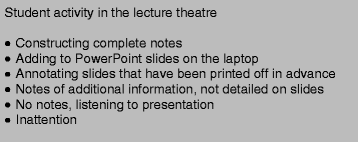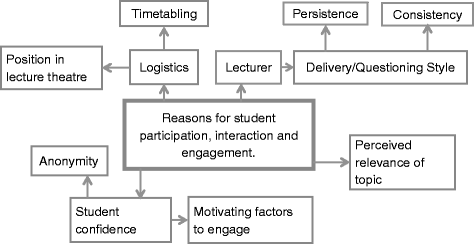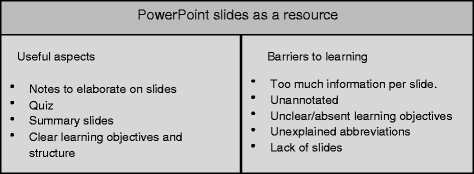Exploring medical student learning in the large group teaching environment: examining current practice to inform curricular development
- PMID: 27435852
- PMCID: PMC4950633
- DOI: 10.1186/s12909-016-0698-x
Exploring medical student learning in the large group teaching environment: examining current practice to inform curricular development
Abstract
Background: Lectures continue to be an efficient and standardised way to deliver information to large groups of students. It has been well documented that students prefer interactive lectures, based on active learning principles, to didactic teaching in the large group setting. Despite this, it is often the case than many students do not engage with active learning tasks and attempts at interaction. By exploring student experiences, expectations and how they use lectures in their learning we will provide recommendations for faculty to support student learning both in the lecture theatre and during personal study time.
Methods: This research employed a hermeneutic phenomenological approach. Three focus groups, consisting of 19 students in total, were used to explore the experiences of second year medical students in large group teaching sessions. Using generic thematic data analysis, these accounts have been developed into a meaningful account of experience.
Results: This study found there to be a well-established learning culture amongst students and with it, expectations as to the format of teaching sessions. Furthermore, there were set perceptions about the student role within the learning environment which had many implications, including the way that innovative teaching methods were received. Student learning was perceived to take place outside the lecture theatre, with a large emphasis placed on creating resources that can be taken away to use in personal study time.
Conclusions: Presented here is a constructive review of reasons for student participation, interaction and engagement in large group teaching sessions. Based on this are recommendations constructed with the view to aid educators in engaging students within this setting. Short term, educators can implement strategies that monopolise on the established learning culture of students to encourage engagement with active learning strategies. Long term, it would be beneficial for educators to consider ways to shift the current student learning culture to one that embraces an active learning curriculum.
Keywords: Active learning; Interaction; Learning culture; Lecture; Medical students.
Figures
References
-
- Huba ME, Freed JE. Learner centered assessment on college campuses: Shifting the focus from teaching to learning. 2 2000.
-
- Sander P, Stevenson K, King M, Coates D. University Students’ Expectations of Teaching. Stud High Educ. 2000;25(3):309–23. doi: 10.1080/03075070050193433. - DOI
-
- Bonwell CC, Eison JA. Active Learning: Creating Excitement in the Classroom. 1991 ASHE-ERIC Higher Education Report No 1. Washington, D.C: The George Washington University, School of Education and Human Development; 1991.
-
- Bishop JL, Verleger MA. The flipped classroom: A survey of the research. ASEE National Conference Proceedings. Atlanta: American Society for Engineering Education; 2013.
MeSH terms
LinkOut - more resources
Full Text Sources
Other Literature Sources




